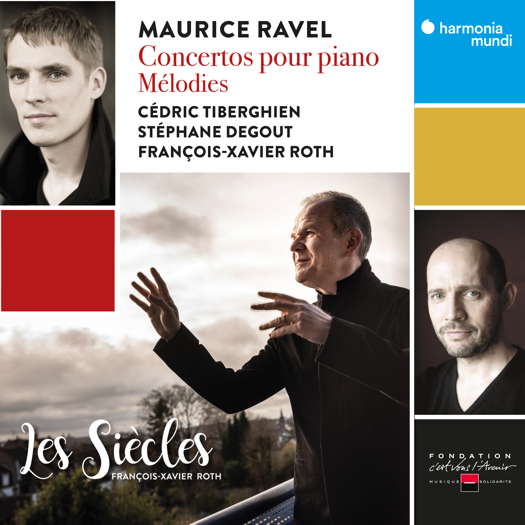- side titles
- Neapolitan
- Luís de Freitas Branco
- Guild Historical
- Peter Reynolds
- Ethel Smyth
- John Schaefer
- Vienna State Opera Orchestra

Subtle Differences
Ravel on period instruments, heartily recommended by GEOFF PEARCE
'... a very exciting performance ...'
I was very keen to review this disc, largely because it is played on instruments made during Ravel's lifetime, and as he was a master orchestrator, I was keen to see what difference this may make, particularly with the piano concertos. There is a very good booklet which lists the instruments used and when they were made.
The Piano Concerto in G is one of the works I could not live without. There are so many good recordings on modern instruments, and I think many listeners would not notice any jarring differences, but they are there. There is a clarity with this Pleyel piano that is often not as obvious on the more modern concert grand of today. To my ears, the bass is more sharply defined as is the treble, whilst I find the middle of the instrument really sparkles and has perhaps more colour. The instrumental sound, particularly in the woodwind and brass, is perhaps a little lighter, sharper edged in detail, and the sound is not forced. I love the sound of the French bassoons, which is quite different from the predominance of German Bassoons which are more widely used these days.
The beauty of the second movement will make you melt. I think this is the soul of this concerto, and this recording stands up with the best of what is available. Cédric Tiberghien is a very sensitive player, and brings out the subtleties of the range of colours that his piano can bring. The wind parts of this movement are so important, and again I find the sound subtly different from what I hear on more modern instruments, especially in the Cor Anglais solo - the sound is completely different. The player performs on an 1890 Loree instrument, and the sound is warm, very human and well-focussed. Modern instruments perhaps project a bit more, but I think this player and instrument are exceptional.
Listen — Ravel: Adagio assai (Piano Concerto in G)
(HMM 902612 track 2, 6:56-7:53) ℗ 2022 harmonia mundi musique sas :
In the third movement, the clarity and excitement of this music and the jazz influence are strongly felt. I also like the fact that the piccolo appears a lot less shrill than they often can. This is a very exciting performance and I love the instrumental colour, and the crystal clear and exciting piano.
Listen — Ravel: Presto (Piano Concerto in G)
(HMM 902612 track 3, 3:11-3:54) ℗ 2022 harmonia mundi musique sas :
Three Songs Of Don Quichotte à Dulcinée, short and delightful, are in dance rhythm. Stéphane Degout is a fine baritone, and together with Cedric Tiberghien make these songs really come alive. These were Ravel's last compositions, completed in 1933.
Listen — Ravel: Chanson épique (Don Quichotte à Dulcinée)
(HMM 902612 track 5, 0:00-0:58) ℗ 2022 harmonia mundi musique sas :
I had not heard Deux Mélodies hébraïques before. The first is a very sorrowful and powerful 'Kaddish'. The piano plays a strictly accompanying role here and the emotion is very raw for both performers. The second song, much more gentle and perhaps even playfully mysterious, is very short.
Listen — Ravel: Kaddish (Deux Mélodies hébraïques)
(HMM 902612 track 7, 3:06-3:47) ℗ 2022 harmonia mundi musique sas :
Whilst the famous Pavane pour une infante défunte, written whilst Ravel was still a student in 1899, is often played in an orchestral version, it is performed in the solo piano original here, perhaps with slightly more pace than when often performed, Cédric Tiberghien plays with great sensitivity and with full sonority when called upon to do so, and I like this performance very much. The sound is different and, dare I say, more varied than is achieved on a more modern instrument.
Listen — Ravel: Pavane pour une infante défunte
(HMM 902612 track 9, 2:29-3:19) ℗ 2022 harmonia mundi musique sas :
Trois Poèmes de Stéphane Mallarmé remind me what a fine song composer Ravel was. These three songs, written in 1913, with their blurred and shifting tonalities, are sensitively performed and one would be hard pressed to find better proponents.
Next comes the Concerto in D for the Left hand. This work was begun in 1929 and is scored for a larger orchestra than the Concerto in G major. It is more sombre than the G major work, and, although it was the one I heard first in my youth, I did not initially warm to it, but certainly have come to appreciate it more and more as I got older. It is in one movement, and today it is often performed, although perhaps not nearly as often as the G major work. The performance it receives on this recording is quite amazing, and I find the use of the instruments made within Ravel's lifetime even more telling than in the concerto that opens this disc. It is now my favourite recording of this work, and one I think most listeners will fully appreciate, not just for the very fine piano playing, but also in the wider range of orchestral colour than perhaps one is more used to hear. I urge everyone to enjoy this performance. There is a different voicing than one would hear on a more modern piano, and I find this very suitable for this very individual work. The more I listen to the music of Ravel, the more I appreciate his genius.
Listen — Ravel: Concerto for the left hand
(HMM 902612 track 13, 8:04-9:03) ℗ 2022 harmonia mundi musique sas :
The final track, a little song entitled Sainte, is another setting of a Mallarmé poem, and was written in 1896. This is the earliest work of Ravel on this disc and is a suitable ending.
I am a lover of older instruments - all my oboes are made between 1910 and 1935 - so I can readily identify with what this disc has achieved. I think there is a wider range of expression and tonal qualities. I do not suggest that this is better than with modern instruments, but rather that it is different and perhaps, more in keeping what may be in the composer's mind at the time of writing. I do think that you will enjoy the subtle differences without being alienated by them, so I heartily recommend these performances that are a credit to all who collaborated.
Copyright © 13 June 2022
Geoff Pearce,
Sydney, Australia

CD INFORMATION - RAVEL: CONCERTOS POUR PIANO; MÉLODIES




